Luke Mueller is a twenty-nine year old emergency medicine doctor and keen hill walker, cyclist, runner, climber and skier. I was lucky enough to work with Luke in the emergency department at Ysbyty Gwynedd (Bangor hospital), North Wales for the first half of 2020. In August 2020 Luke went to the Isle of Skye for what was supposed to be a week long holiday with his then girlfriend. Unfortunately things didn’t go to plan; on the second day of his trip Luke had a catastrophic accident that led to a challenging nine hour rescue, expertly managed by the Skye Mountain Rescue Team together with Stornaway helicopter crew. In a critical condition, Luke was flown to Aberdeen Royal Infirmary (the nearest major trauma centre) where he spent ten days in the Intensive Care Unit and a total of seven weeks in hospital.
Luke kindly agreed to talk to me about his accident and his ongoing recovery.
What were you doing on Skye and what was your route plan for that day?
With a week of annual leave I drove up to Skye and spent the first day on a beautiful coastal walk. The trail was pretty rocky and my girlfriend unfortunately sprained her ankle. Although it wasn’t a bad injury, she needed to rest it the following day so I went out walking by myself to Loch Coruisk at the of the bottom of the Dubh Slabs. I met my girlfriend there as she had taken the ferry round to meet me and we camped here overnight. I remember spending the evening pouring over my map and guidebook, planning my route for the next day – a solo scramble on the Dubh slabs.
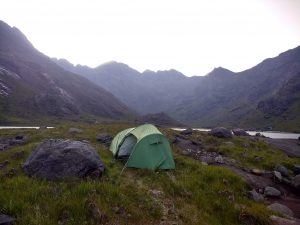
What can you remember from the accident?
Absolutely nothing. I remember getting up early and setting off at around 05.30 on 14th August, but that’s where my memory goes blank. In total I’ve lost about two weeks. Amazingly my phone survived the accident and I’ve got photos on it that I took at 11:30 on a peak at about 900m so I’m guessing the accident happened shortly after that.
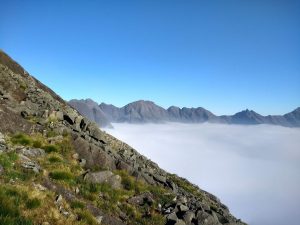
What have you found out since about what happened?
I’ve had information from family as well as directly talking to the rescue team which was really helpful in getting some questions answered. The initial call for mountain rescue help came from two climbers who were near by and heard what they described as rock fall followed by the sound which they thought could have been a body hitting rocks/ground. The Skye Mountain Rescue Team searched for four hours before they found me. I was unconscious but maintaining my own airway quite well (they placed a guedel). My temperature was normal but my heart rate was 150 bpm so I was obviously working hard to maintain my temperature. Based on where I was found and the injuries I sustained, the rescuers believe I probably fell 80-100 feet down a rocky gully. I was packaged up and taken by helicopter to the nearest major trauma centre at Aberdeen.
By 18:00 my girlfriend (who was in the back of the van preparing dinner ready for us) was getting worried as I was supposed to have met her about two hours before. A little while later when I still hadn’t made an appearance she started making calls and that’s when she found out from the Mountain Rescue Team what had happened.
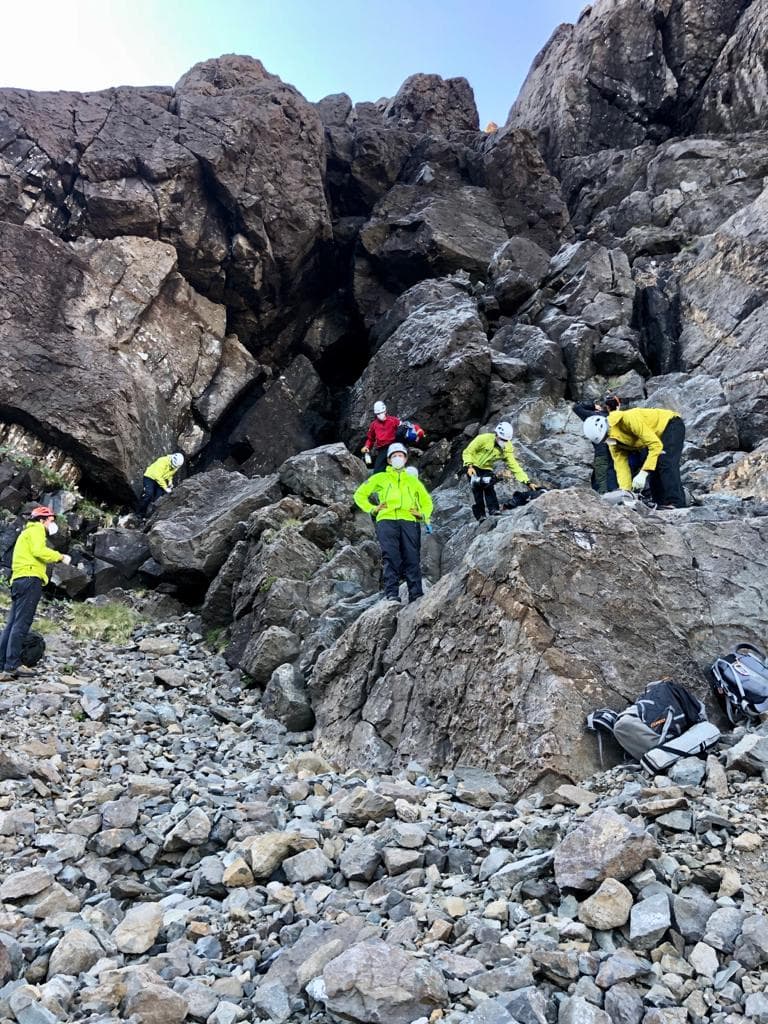
I got my phone back on 28th August which was pretty big because then I could piece things together a bit more for myself and obviously I could read all the messages from friends, family and colleagues. In particular, checking the messages in my work whatsapp group was really helpful in finding out what had happened to me. My family were keeping one of the A&E Consultants updated on my progress and she then updated the team via whatsapp. Reading these updates gave me much more detail about my injuries which at that stage I didn’t have full knowledge of. I tried to send some messages but my dexterity was poor, I couldn’t type so the nurses helped me to make some calls.
What injuries did you sustain?
- Traumatic head injury (diffuse axonal injury – this severe injury is usually associated with high speed road traffic accidents, because of the forces from rapid acceleration or deceleration). About three weeks after the accident I vaguely remember the neurosurgeon taking me into a room to show me the MRI scan images of my brain. He was explaining the diffuse axonal injury and showing me some small subarachnoid haemorrhages. It was very surreal, I don’t remember our whole conversation and I wish I had taken photos of the images to look at now.
- Left open proximal tibia fracture (fixed with surgery).
- Right patella fracture and wound (the wound was washed out in theatre, the fracture was managed conservatively).
- Some lumbar spine fractures (seen on the trauma CT scan although I never had any back pain).
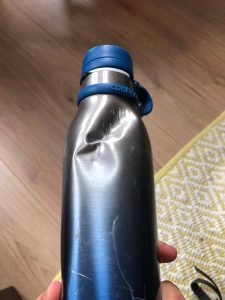
What is your first memory after the accident?
I had just been stepped down from the high dependency unit (HDU) to a normal ward and I remember a friendly nurse settling me in to my new room, handing me the patient call bell and telling to press the button if I needed the toilet. I laughed thinking she was joking about me needing help but then I looked down and saw my legs covered by dressings. I just couldn’t believe it; I had no idea how it had happened. A while later, ignoring the advice from the nurse (doctors make the worst patients), I got up to try to walk the ten metres to the bathroom. I made it most of the way before collapsing in the corridor. I haven’t got a clear memory of this but I do remember jokingly apologising to the staff about causing them extra paperwork. This was about two weeks after the accident. I’d spent ten day in ITU and four days in HDU but I’ve got no memory of this at all.
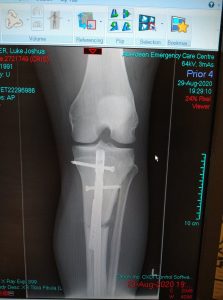
Do you think that being a doctor has made this experience any easier or harder in terms of understanding the extent of the injuries and what that could mean for your future?
Very early on once I found out what had happened I just knew I’d had a whopping head injury and I hoped the ‘brain fuzz’ I felt was temporary. But then once it started to sink in that I’d had diffuse axonal injury and that my memory and processing wasn’t all there I did start to have concerns about ever getting back to normal. I guess anyone would have those sorts of concerns, but I was certainly concerned about my career if my brain didn’t fully recover. By early September I started to feel my memory had improved and felt like I was getting my head together. I was having lots of cognitive assessments with clinical psychologists and felt fine pretty quickly. I had a very unpleasant surprise in mid-late September when I was having a cognitive assessment and I thought I was doing great until right at the end the psychologist asked me to recall what she’d told me at the start of the session and I had no idea. That’s when I realised I was still struggling on recall and I had to acknowledge my brain wasn’t functioning fully after six weeks of recovery. It was a scary moment, especially because I thought I was fine.
What did the rehab involve?
I spent four weeks at Aberdeen, two of which were in ITU/HDU. I was completely non-weight bearing on my left leg after the surgery so I only had a small amount of physio at this stage. I was then transferred to the Walton Centre for three weeks and initially I was given a wheel chair so I least I could get about a bit but I wanted to get up and start walking. Unfortunately there was no orthopaedic plan saying I was allowed to weight bear so the physios wouldn’t touch me. Fortunately I was referred to the orthopaedic team at Liverpool who saw me within three days and did another X-Ray. They were happy I could now weight bear so I made sure they documented it clearly so the Walton physios would be happy. This is when I finally got up on crutches which might not sound like much but it meant I gained some independence back, the simple stuff like self care. This was a really big deal after weeks of needing help with everything! I practiced daily with the crutches and had regular physio sessions. By this point I felt cognitively back to normal. In terms of neurology follow-up I was referred to the brain injury service. In mid November I managed to persuade the psychologist to do a one off four hour assessment instead or the normal two x two hour sessions because I just wanted to get it done. I achieved a ‘normal’ score but the psychologist said that she would expect me to be a bit higher than normal so maybe there is still some room for improvement there.
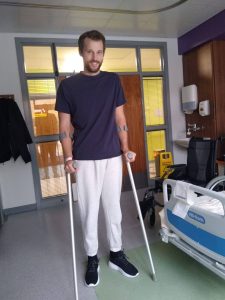
Were there any times you thought you wouldn’t get better or back to ‘normal’? If so how did you cope with that?
It has felt like such a long rehab. When I got to the Walton Centre I was working with the physios who were helping me start walking again. I wanted to be totally off crutches by the time I was discharged home but the physios weren’t sure this was realistic. They were happy with my progress but I wasn’t happy with my walking pace or pace of improvement. The physios set up a ten metre racetrack and timed me on it, and then they set me to work to improve on it for the same time the next week. Little challenges like that helped keep me motivated when I got frustrated. When I was discharged (still with one crutch) on 2nd October I went straight for a pub lunch with a lovely pint of moreti. I’d lost weight in hospital and obviously hadn’t had alcohol for a while so when it came to getting up to go to the loo I was a bit concerned I’d be too tipsy to walk without tripping up on one crutch – luckily, I made it!
In December I went to the climbing wall with my brother which was great but I got a bit frustrated that I was struggling on some of the easy grades after a couple of hours. My brother made me realise I needed to relax about it, to remember I’m lucky to be alive, walking and talking and the previous fitness is something that can’t be expected immediately but I’ll keep working on it.
How did the COVID pandemic effect your time in hospital?
It was very difficult early on, for my family more than me because they weren’t allowed to visit me. My Mum and brother were basically smuggled into the ITU to see me once, just after it happened and that was it. I think my brother found it very tough to see me like that – unconscious and on a ventilator. After the initial period it got better because restrictions eased and Mum was allowed to visit for me for one hour a day that was great. Near the end of my time in hospital we were back into a lock down again so no visitors were allowed. Apart from visitors I’m not sure the pandemic affected much of the medical care I got. I received great care but I’ve lost count of the number of times I was swabbed for COVID!
Has this experience made you think about medicine or about hospitals differently?
It has certainly given me more insight into the ‘other side’: the patient experience. It hasn’t changed my career interest for emergency medicine. It has probably made me more empathetic because now I know what it’s like to have your independence removed. I had great treatment in all the hospitals. I did have a laugh when one of the health care assistants at the Walton centre asked if she should call me Luke or Dr. Mueller – just Luke is fine, thanks!
How are things now, five months on from the accident?
Overall I’m really happy with how I’m doing. I passed my FRCEM primary in December (a major exam on the training programme to become an Emergency Medicine Consultant) and I’m enjoying being back at work. I’ve been really lucky because the whole Bangor ED team are really supportive and the Consultants have been great, making sure I have a staged return to work etc. I was a bit nervous about things like procedural skills after so long away and the first patient I had to cannulate was an IV drug user with classically difficult veins but I got it first time and won’t deny I was chuffed! The orthopaedic team saw me on 8th January and were happy with my progress. They think it might be another eight weeks until I can run pain free but I think it’s anyone’s guess to be honest. It’s absolutely great to back in North Wales, getting out walking locally.
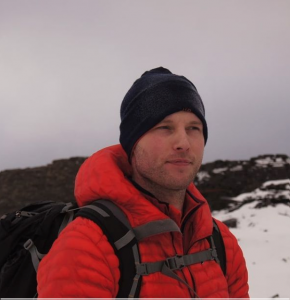
In December I was invited to attend the virtual AGM for the Skye Mountain Rescue Team, which was a great experience for both them and me I think. A few of the team had struggled after the rescue, due to the severity of the condition they found me in and the challenge of the rescue itself. I think it was positive for them to hear I am doing well, they thanked me a lot which was funny because they saved my life, I felt like it was just me who should be thankful!
Has this accident made you think differently about risk in the mountains?
No, not really. I’ve always been careful, always taken risk seriously. I plan routes within my comfort zone or just outside of it. The rescuers said that it is likely I just lost my footing and fell that day. I’ve wondered whether I would have done things differently had I been with someone else, maybe we would have chosen to belay each other down the gully, I don’t know, probably not. It’s all pondering. I’m just going to keep doing what I enjoy, I’ll just tell my parents less about it! The first walk I went on when I got back home to Snowdonia was on the easy trails in the slate quarry near my house. I sent my Dad a photo of me overlooking the Llanberis pass with Snowdon in the background – he went psycho!
Are there any particular lessons you’ve learned form this whole experience?
Ooo that’s a hard one…. Patience; that has got to be one. The physical recovery has been frustrating. For someone who has never had a major injury before this and kept himself fit and active, adjusting to having to accept help for simple things and learning to do things more slowly has been a huge challenge. When you get your physical independence taken from you in an instant, it’s awful. Luckily, I’ve been able to get mine back, but it has certainly made me more patient and more grateful. It’s cliché but we take lots for granted. I’m definitely more grateful for everything now.
Do you have any particular mountain goals for the future?
In July 2020 I had planned to do the Welsh 3000’s in less than twenty-four hours but the weather patterns never worked with my days off work so it didn’t happen. I would like to do it this year if possible but it will take time to get up to that level again. I’ve managed to rope my brother into the idea though and I’d love to use the challenge it to fundraise for the Skye Mountain Rescue Team.
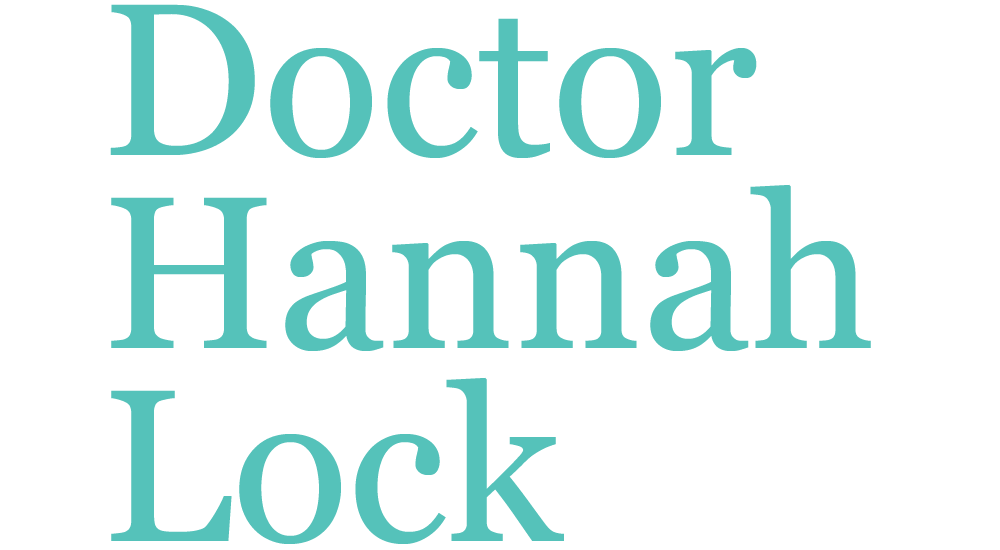
Wow! Bloody lucky guy and amazing work from the rescue teams and NHS in the middle of a pandemic. All the best for the rest of your recovery.
Luke – it’s been good to see your account of this whole event! When I was first contacting you I didn’t know if it was you replying or if you’d already roped in a glamorous PA!
Doing the Welsh 3000 s is a great challenge – if you need support crew, and we’re allowed over the border to Wales, I think the WMC can rustle up help along the way……. Caz